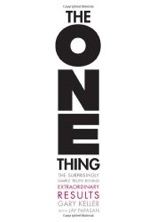The One Thing: The surprisingly simple truth behind extraordinary results, by Gary Keller
[
Buy from Amazon
Gary Keller proposes a framework for achieving extraordinary results in work and in life in general. The author’s premise is that extraordinary results are directly determined by how narrow you can make your focus, or more precisely, by focusing on the One Thing.
[Achievers] have an eye for the essential. They pause just long enough to decide what matters and then allow what matters to drive their day. Achievers do sooner what others plan to do later and defer, perhaps indefinitely, what others do sooner. The difference isn’t in intent, but in right of way. Achievers always work from a clear sense of priority.
The author explains how getting things done is not a matter of discipline but of developing habits that will help you focus on the task at hand. Discipline is needed to acquire the habit, but we cannot run on discipline in the long term.
Achieving extraordinary results requires making extraordinary efforts. In that sense, Keller does not believe in a balanced life as a goal to be achieved or a state of balance, but in counterbalancing your life as an every day reality, an act of balancing.
If you think of balance as the middle, then out of balance is when you’re away from it. Get too far away from the middle and you’re living at the extremes. The problem with living in the middle is that it prevents you from making extraordinary time commitments to anything. In your effort to attend to all things, everything gets shortchanged and nothing gets its due. Sometimes this can be okay and sometimes not. Knowing when to pursue the middle and when to pursue the extremes is in essence the true beginning of wisdom. Extraordinary results are achieved by this negotiation with your time.
One day you finally come to understand that work is a rubber ball. If you drop it, it will bounce back. The other four balls—family, health, friends, integrity—are made of glass. If you drop one of these, it will be irrevocably scuffed, nicked, perhaps even shattered.
The book mentions the now-more-known Stanford Marshmallow Experiment by Walter Mischel, which relates the effect of delayed gratification and developing grit with outcome and success in different areas in life.
Keller also cites Carol Dweck’s research on growth-mindsets vs fixed mindsets as an example of how your perception of things strongly affect what you can achieve:
Dweck’s work with children revealed two mindsets in action—a “growth” mindset that generally thinks big and seeks growth and a “fixed” mindset that places artificial limits and avoids failure. Growth-minded students, as she calls them, employ better learning strategies, experience less helplessness, exhibit more positive effort, and achieve more in the classroom than their fixed-minded peers. They are less likely to place limits on their lives and more likely to reach for their potential
Keller’s framework is constructed on applying what he calls the Focusing Question to the different areas of your life: What’s the ONE Thing I can do such that by doing it everything else will be easier or unnecessary?
Productivity isn’t about being a workhorse, keeping busy or burning the midnight oil…. It’s more about priorities, planning, and fiercely protecting your time. To stay on track for the best possible day, month, year, or career, you must keep asking the Focusing Question. Ask it again and again, and it forces you to line up tasks in their levered order of importance. (…) you can drive yourself nuts analyzing every little aspect of everything you might do. I don’t do that, and you shouldn’t either. Start with the big stuff and see where it takes you. Over time, you’ll develop your own sense of when to use the big-picture question and when to use the small-focus question.
Answers to the Focusing Question come in three categories: doable (something that is already within your reach), stretch (at the farthest end of your range), and possibility (an answer that exists beyond what is already known and being done). “Highly successful people”, explains Keller, “choose to live at the outer limits of achievement. They not only dream of but deeply crave what is beyond their natural grasp.”
The Focusing Question, however, is not enough. Adopting the mindset of someone seeking mastery is needed (the commitment to becoming your best, and embrace the effort it represents).
More than anything else, expertise tracks with hours invested. Michelangelo once said, “If the people knew how hard I had to work to gain my mastery, it wouldn’t seem wonderful at all.”
You will also need to deal with the natural ceiling of achievement with a purposeful mindset (not accepting the limitations of our natural approach as the last word), and learn to be accountable for the outcome of your lives (in contrast with being a victim of the situation). This is essential —according to Keller— to achieve extraordinary results.
If you have to beg, then beg. If you have to barter, then barter. If you have to be creative, then be creative. Just don’t be a victim of your circumstances.
Almost finishing the book, Keller warns the reader against the four thieves that can stand in our way to extraordinary results. The inhability to say “No” , the fear of chaos —“pursuing your One Thing moves other things to the back burner (…) chaos is unavoidable. Make peace with it. Learn to deal with it”— , poor health habits, and an environment that doesn’t support your goals.
I enjoyed reading the book and strongly agree with most of what the author proposes. You can use the framework “as-is” or adapt it to suit your needs.
Find The ONE Thing: The Surprisingly Simple Truth Behind Extraordinary Results in Amazon.